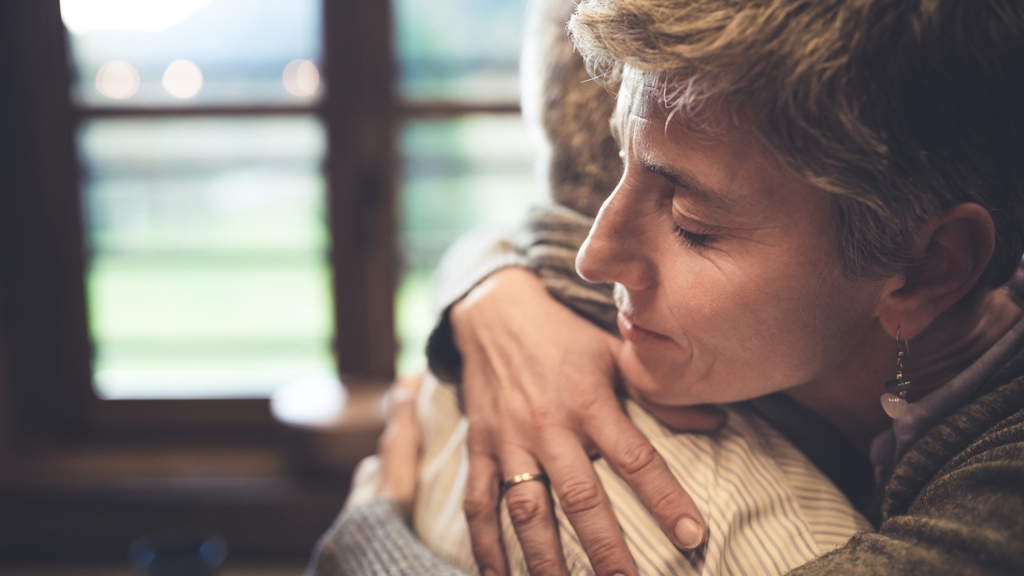The hours, days, or weeks leading up to a death are usually stressful for everyone.
In addition to the medical issues that arise, we are often worried about what we should say and do. Are we acting properly? Can we do anything to help? What does Jewish tradition ask of us?
Regardless of how religious the dying individual is, there is often comfort in traditions that have been Jewish practice for centuries. Below are some Jewish traditions and resources to help guide you through this difficult time.
Recite (or Sing) the Mi Sheberakh and Other Prayers
Dying is often a stage on the continuum of illness, and it is appropriate to say prayers for healing, even when we know our loved one has a terminal illness and is not expecting to recover. The Mi Sheberakh prayer, the traditional Jewish healing prayer, focuses not just on healing of the body, but also healing of the spirit. You can say it alone or with your loved one. It can be recited or sung, and music can be especially soothing and comforting. For the text, along with several musical versions of the Mi Sheberakh, click here. Below is one of the most popular melodies.
You can also offer a more spontaneous and personal prayer (e.g., “God, I ask your compassion for _____ that he/she find peace in these difficult days”). Some people may find recitation of the Shema, one of Judaism’s most important (and short) prayers, comforting. If your loved one is atheist or agnostic, you can simply omit mention of God in reciting any of these prayers. E.g., replace “God, I ask your compassion…” with “We hope that ___ will find peace….”
Bring in Music, Including Niggunim
In addition to Mi Sheberakh, any comforting music can be helpful at this time, including live musicians with instruments as appropriate, humming niggunim (wordless Jewish liturgical melodies), or singing favorite songs to the dying.
Read or Chant Psalms
Psalms, the biblical poems believed to have been compiled (and in many cases written) by King David, are often read or chanted when a loved one is sick or dying.
Psalm 23, which begins “Adonai is my shepherd,” is perhaps the best known of all the psalms. Though often associated with funerals, it can also be comforting to the ill. Psalm 30, Psalm 121, and Psalm 150 are also appropriate choices. Another option is Psalm 119, which is an acrostic, and choose those verses whose opening letters spell out the individual’s Hebrew name.
Listen to Psalm 23 (courtesy of Mechon Hadar)
Recite the Viddui
Encourage and assist your loved one to recite the viddui (”confession”) prayer, or read one aloud on his or her behalf. While we do a form of viddui on Yom Kippur, there is a specific “deathbed” version. This version includes not only repentance themes, but faith and trust elements as well. For the traditional text in Hebrew, click here. For the text in English, as well as many non-traditional versions of viddui to download and print out, click here.
Help Write an Ethical Will
Encourage and assist your loved one to create an ethical will, a summary of the values and lessons beyond the material possessions that you wish to transmit to those who survive you.
Discuss Funeral Arrangements if Appropriate
If funeral arrangements have not been set (and especially if this may be your responsibility), delicately raise the subject. If the individual has not yet acknowledged that he/she is dying, you will need to be particularly circumspect. You might begin with an open-ended question like, “What do you understand about your medical prognosis?”
Once the prospect of dying has been acknowledged, you can ask an open-ended question like: “Have you thought about final arrangements?” The ensuing discussion can include whether the individual has a cemetery plot or has made other arrangements for disposition of his/her body and how traditional they want their funeral to be. It can also include questions about Jewish rituals such as tahara, the traditional practice of preparing a body for burial, and whether to bury or cremate. (Jewish law forbids cremation, but the practice has become increasingly common in recent years.)
While your loved one may not ordinarily observe Jewish traditions, he or she may derive comfort from observing rituals and traditions that his or her ancestors, and the larger Jewish community, have observed for centuries.
Other specific questions you may want to ask:
“Who would you like to have lead your service?”
“Are there specific people you like to give a eulogy for you?”
“Is there music or readings that you would like to have at your funeral?”
“Are there organizations to which you would like to have people give tzedakah (charitable contributions) in your memory?”
Don’t Make Religious Assumptions
Be cautious about providing theological responses to the situation [e.g., “This is God’s will” or “Soon you will be with God in Olam Haba (“the world to come”)], unless you are sure that you know the belief system of the dying individual.
If in doubt about the individual’s theological beliefs, simply ask questions or encourage the dying individual to share his/her thoughts, concerns, fears and hopes.
Be prepared for the individual to have challenging emotions and beliefs, such as being angry with God, or wondering why he or she is suffering. In this regard, Rabbi Harold Kushner’s When Bad Things Happen to Good People may be a useful resource for you or for the dying individual.
Just Be There
Offer him or her your presence, whether in person or in other forms. Visit, call, write. Communicate in whatever way is most appropriate for you and the dying individual. Listen, listen, listen. Encourage the individual to share thoughts and feelings.
Speak the truth to the dying individual. Do not hide your own emotions. At the same time, be sensitive and compassionate.
When the Dying Individual Is an Acquaintance
If the dying individual is an acquaintance rather than a family member or very close friend, offer personal support not only to the ill individual, but also to those who are the primary family members and caretakers. This can be emotional support (mostly, being an empathic listener) as well as logistical support (e.g., providing food, rides, child care, and other daily assistance).
Help make available the resources of your and the dying individual’s larger community. Such resources might include chaplaincy support, rabbinic support, family member support, music and thanatology options, legal and ethical document arrangements, etc.
Provided by Kavod v’Nichum, a nonprofit educational organization that promotes and assists the formation of bereavement committees and chevrah kadisha (Jewish burial society) groups in synagogues and communities throughout North America.
Sign up for a Journey Through Grief & Mourning: Whether you have lost a loved one recently or just want to learn the basics of Jewish mourning rituals, this 8-part email series will guide you through everything you need to know and help you feel supported and comforted at a difficult time.
Looking for a way to say Mourner’s Kaddish in a minyan? My Jewish Learning’s daily online minyan gives mourners and others an opportunity to say Kaddish in community and learn from leading rabbis.



